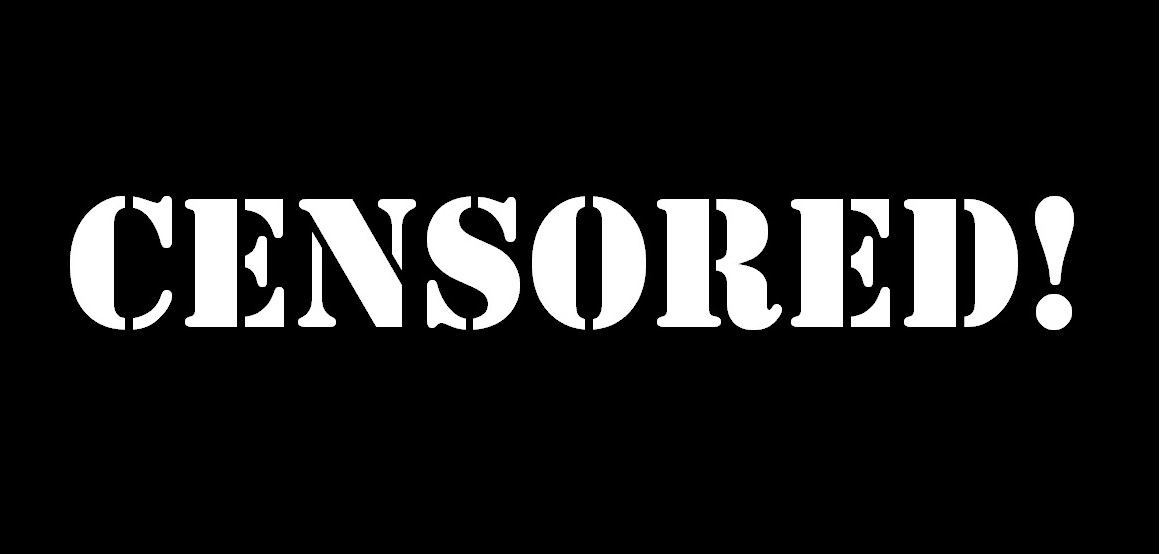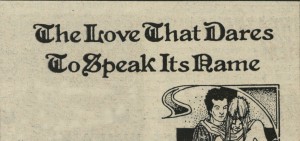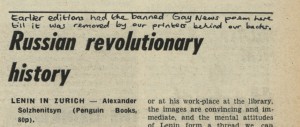
February 25, 2015, by Kathryn Steenson
Gongster and the ‘Gay News’ poem
Since its inception in 1939, The University of Nottingham student newspaper Gongster (now Impact) has often been used as a platform to rally against oppression and censorship, even when the paper itself has come under scrutiny and dictates. In 1978, however, the paper became a victim of censorship itself; in this particular case by their own printers. A supplement sheet typed up by one of the editorial team, bound in with the volumes of Gongster here at Manuscripts and Special Collections, explains the behind the scenes heist which scuppered their attempted printing of a recently banned gay-themed poem, The Love That Dares to Speak Its Name by James Kirkup.
The controversial Kirkup poem about a Roman centurion who makes a lustrous move on Jesus Christ after he is removed from the cross, was originally published in the magazine Gay News in 1976. Its explicit sexual content, including descriptions of Jesus having a more than platonic relationship with a fair few characters from the New Testament – including his disciples (Judas was ‘a great kisser’), Herod’s guards, and Pontius Pilate – meant that soon enough the poem fell into the lap of social conservative Mary Whitehouse. Whitehouse was notorious for her staunch criticism of media content she considered immoral or against Christian tradition, and she prosecuted Gay Times in what became the UK’s last successful trial for blasphemy. The poem was banned and the editor sentenced to nine months in prison (later quashed on appeal). But the publicity from the trial spurred on gay activist societies across the country.
This rise in activism can be seen in issues of Gongster from the late 1970s which show a sudden influx in notices and articles arranging for gay students at the University to meet, socialise, and join in with political activist organisations in the East Midlands. Articles, such as the one on 21st June 1977 about Whitehouse’s case against Gay News rallied support for the newspaper by the union’s Gaysoc (the forerunner to today’s LGBT Network), and a later article in the May 10th 1978 issue invited readers to join the East Midlands Gay Activities Alliance based in Leicester, as well as advertising a planned picketing of a Nottingham branch of W.H. Smiths after the chain announced they would cease selling Gay News.
The May 10th 1978 issue of Gongster also saw the editors decide to illegally publish the banned James Kirkup poem in its entirety, complete with its original Gay News illustration of a centurion embracing the naked Jesus. As detailed by the editors in the tell-all supplement sheet, the Gongster team had already had several scuffles with the printers regarding this issue’s content; when they turned up to inspect the proofs they discovered that the printers had removed an article commenting on an anonymous witness being exposed in the ongoing ‘ABC trial’, and that there were numerous typographical errors throughout. The manager of the printers refused to allow any other corrections to be made so as to not ‘delay his precious schedule by a couple of minutes’. After witnessing the first few issues being printed the students left the building, so it was only after all the copies had been collected ready for distribution that they realised the printers had stopped the press mid-run to replace the Kirkup poem with a previously rejected review of the Alexander Solzhenitsyn book ‘Lenin in Zurich’.
Only a few of the original printing got through, and we are lucky that a copy of both versions of the issue have been preserved – along with explanation and annotation – in our holdings. We can’t show the poem here as it is still a crime in the UK to publish either the poem or the explicit illustration accompanying it, but our copies of Gongster can be seen by appointment in our Reading Room.



As the UK blasphemy law was abolished in 2008, publication of the poem or illustration is no longer illegal. I’d be grateful if you could therefore publish the relevant pages of Gongster in full, as you clearly have access to high-quality scans of the originals.
Hi Matthew. Thanks for the correction. You’re right that the Blasphemy legislation has been repealed, however the page isn’t appropriate to publish on the blog.